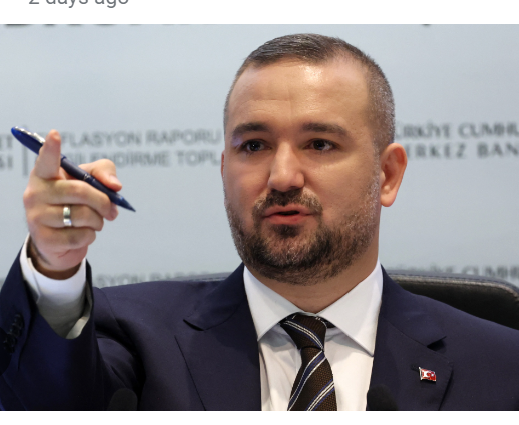Turkey’s Central Bank Governor Fatih Karahan sat down for an interview with Bloomberg in Istanbul on Thursday and talked about the monetary authority’s forward guidance, inflation outlook, reserves, lira liquidity and swap regulations. Karahan made very important comments on the conduct of monetary policy, which is yet to be communicated in Turkish. He sounded very hawkish on interest rates, while acknowledging that inflation perceptions were much higher than in the Bank’s monthly Participants Expectations Survey. He added that the course of monetary policy will be set with a view on reaching the end-2025 CPI target of 14%, not YE2024 target.
Here are important sections from the interview, the full text of which is linked here. Questions are deleted.
Our guidance focuses on monthly inflation data over headline inflation due to base effects, which have pushed inflation up until May and will push it down in the coming months. June’s seasonally adjusted monthly inflation trend was 2%, in line with the trajectory in the inflation report. As we have previously communicated, we anticipate it to average around 2.5% in third quarter and drop below 1.5% in fourth quarter. The June inflation data, coupled with other indicators pointing to a demand moderation, gives us optimism that we are on the right path. That being said, given the high volatility of inflation and us having only one month of solid data, it would be premature to conclude that the decline in underlying inflation is both significant and sustained.
Improvements in inflation expectations are another component of our forward guidance. We closely monitor the inflation expectations of market participants, firms, and households. Expectations of market participants are starting to converge with our forecast for this year. We want to see clearer improvements in households’ and firms’ expectations so we can take some comfort that inflation expectations will support the disinflation process.
As emphasized in all of our policy documents and MPC decisions, we will maintain our tight monetary stance until we see a significant and sustained decline in monthly inflation and inflation expectations converge to our forecasts. Latest data show that the moderation in domestic demand is beginning to affect pricing. The strong monetary stance has also led to a real appreciation of the Turkish lira, which is supporting disinflation. But, despite some improvement, inflation expectations have not fully aligned with our targets. We want to see clearer improvements in broader inflation expectations so we can take some comfort that inflation expectations will support the disinflation process.
Secondly, as you know this is a multi-year disinflation program. Achieving this year’s target is critical for gaining credibility, and we are doing whatever it takes. But it is important to note that it is not the final goal. This means that any actions we take on policy rates should be calibrated so as to hit the inflation target in 2025 and beyond. We need to be confident that we can achieve our target for next year. Given the current situation, it is clear that we need to maintain our cautious stance.
I want to reiterate we don’t have a nominal or real exchange rate target. Nor do we engineer a certain amount of real exchange rate appreciation. Our primary objective is to lower inflation by lowering domestic demand through tight monetary policy. But as a direct consequence of this policy, Turkish lira financial assets become more attractive, their demand increases, which leads to a real appreciation of the lira.
I believe the appetite for Turkish bonds will solidify as the inflation outlook becomes clearer. The June release was a significant step in that direction. While the July reading will be higher due to price increases in administered items like electricity and oil, the subsequent releases will provide crucial insights into the inflation outlook.
Our reserve position has improved significantly but remains below international standards based on various adequacy ratios. Therefore, we would like to further strengthen our reserves. However, our primary goal is achieving disinflation in line with our targets.
We recognize that achieving price stability will eliminate macroeconomic imbalances and facilitate sustainable, long-term reserve accumulation. Therefore, we will always continue to prioritize price stability and accumulate reserves as market conditions allow.
Another aspect of our reserve policy is to reduce foreign exchange liabilities. We have largely eliminated swaps with domestic banks and are now reviewing deposit agreements with international counter parties. Over the last three months, such deposits have decreased by $1.5 billion. We have a road map to further reduce these liabilities in due course.
Follow our English language YouTube videos @ REAL TURKEY: https://www.youtube.com/channel/UCKpFJB4GFiNkhmpVZQ_d9Rg
And content at Twitter: @AtillaEng
Facebook: Real Turkey Channel: https://www.facebook.com/realturkeychannel/
